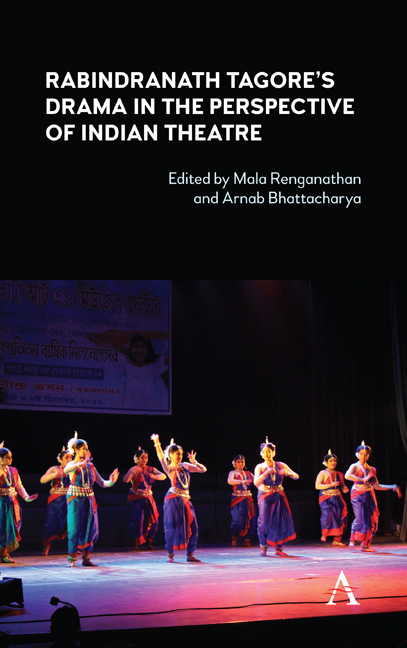Chapter 6 - The Comic Genius of Tagore: Interplay of Humour and Reality in Chirakumar Sabha
Published online by Cambridge University Press: 20 January 2022
Summary
Rabindranath Tagore, the first Asian to win the Nobel Prize, has won worldwide acclaim for his poetry but his worth as a dramatic genius has gained attention only in recent decades. It was not until a few decades that critical writings on his dramatic works began. Out of the 40 plus plays created by him, the most discussed are his dance dramas and some of his prose dramas. However, his comedies have not gained satisfactory critical attention. In fact, critics like P. Guha-Thakurta, Subodh Chandra Sen Gupta, Upendranath Bhattacharya and biographer Edward Thompson consider his comedies as the product of a time when the ‘playwright's poetic powers are resting’, often considering them as his pastime writings that do not have theatrical sensibility. His comedies might be among his lesser-known works but to regard them as his weak productions is to disregard his abilities as a comic dramatist. His comedies are neither too farcical nor totally satirical but very subtly they represent serious issues in a humorous tone. Too much use of satire takes away the fun and frolic of a comedy. Nonetheless, the harsh realities of society do not skip the dramatist's attention but find prominence in passing satirical comments through the characters. The comedies are directed towards provoking laughter but without being harsh on the audience's sensibility. Reality is viewed through the lens of humour without pointing to any individual or social group in particular.
His comedies are not propagandist in nature but try to represent human incongruities in a comic fashion so as to yield to comic relief. He does not seek to rectify society through such representations but brings refinement in the lives of the characters towards the end of the play. This element of refinement differentiates Tagore's comedies from those of his contemporaries and is referred to as ‘high comedy’ that evokes ‘thoughtful laughter’. His comedies not only induce laughter and entertain the audience but also generate profound thoughts without being forceful. They study human nature in depth and bring out the follies only to be laughed at. Although steeped in the immediate reality, they still have a touch of universality which could be one of the reasons for the renewed interest in Tagore drama studies in the present time.
- Type
- Chapter
- Information
- Publisher: Anthem PressPrint publication year: 2020



